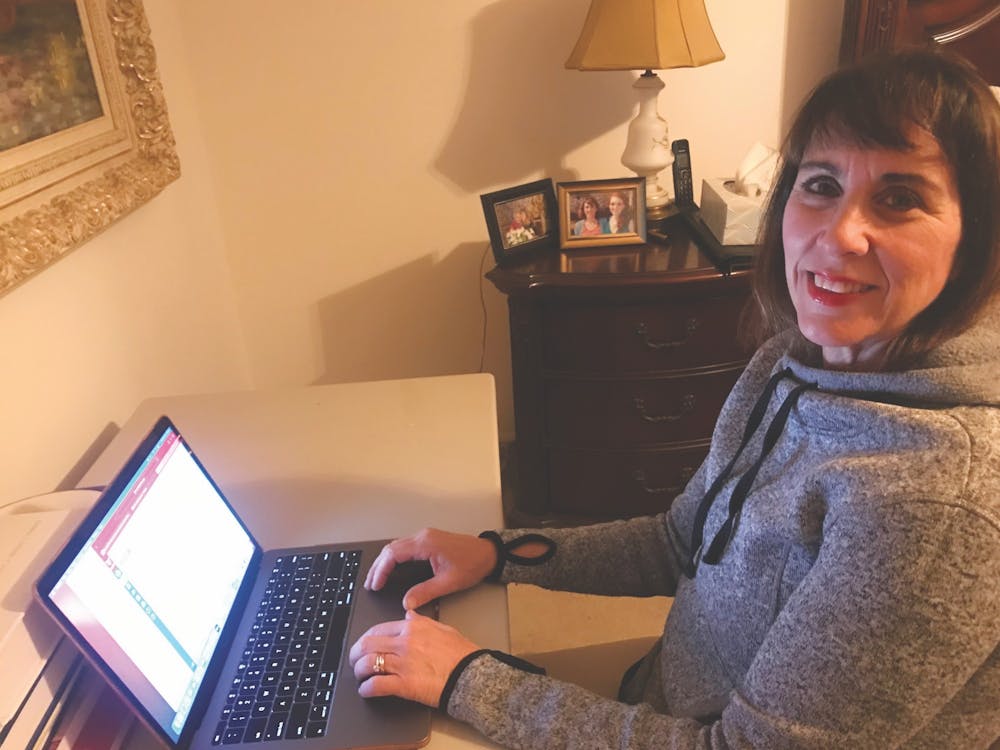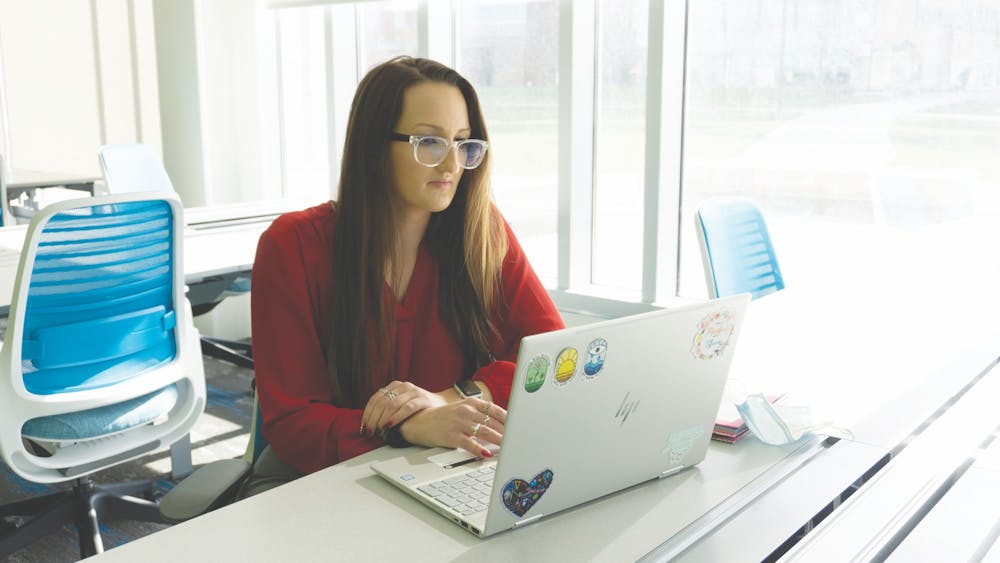The end of the semester is synonymous with graduation, specifically the advancement of graduates into the workforce.
However, for graduate school students, it means the culmination of an additional two years of schooling, taking their education to the next level. While graduate school can take many different paths, the result is often the same: a master’s degree.
Finding her path
Malorie McLain once faced a difficult career decision.
McLain, Ball State psychology graduate student, started her educational path at Le Moyne College in Syracuse, New York. When she finished her undergraduate education at Le Moyne and began looking for PhD programs, she applied to 14 universities, waiting to make a decision on where she would continue her education.
Ball State’s graduate program eliminated that decision.
McLain entered Ball State in the fall 2019 semester, when she started her master’s in rehabilitation counseling. She is now finishing that master’s degree and will continue pursuing her counseling psychology doctorate at Ball State.
McLain hopes to use her training in rehabilitation counseling to help people with chronic illnesses and disabilities, something she retained from her time at Le Moyne. Before changing her major to psychology, she spent two and a half years studying nursing, so Ball State’s master’s program in rehabilitation counseling allowed her to continue that work.
“I still get to have that kind of medical focus in my background but in a counseling setting, so being able to do that with a master's program, I was really excited,” McLain said.
While going through nursing school, McLain realized a more personal, time-intensive approach to patient care suited her best.
“When I was on clinical rotations in nursing school, a lot of times my peers would have to come pull me out of patient rooms because I would just have a chair pulled up next to their bed and I would just kind of be talking to them about life,” she said.
Ball State, with what she described as a “humanistic approach” to its curriculum, allowed her to approach her future career the way she had wanted to since she started her education.
McLain said she’s looking forward to graduating soon, even though graduation for her means more schooling in the Ball State PhD program. Avoiding burnout will be her biggest challenge over the next few years, something she said is relatable for many of her fellow students in her cohort.
“It's hard. It's absolutely hard to be in school for so long and to get burned out,” she said. “I know that it's something I've always wanted. I wanted to push myself to do something that nobody else in my family has ever even thought of doing — just kind of getting to the highest level that I can has always been a dream of mine. And I think it will.”
Grad school, the long way
Twenty-five years ago, Annie Joines Prentice thought her educational journey was finished.
Joines Prentice, Ball State special education graduate student, graduated from the University of North Carolina at Chapel Hill’s undergraduate program in 1995. She went on to teach in Chapel Hill’s school system for several years before having children and becoming a stay-at-home mother for 19 years.
“As my children got older and I realized that they were going to be more independent, I realized that I needed to start thinking about what I was going to do with my future, and I wanted to find a way to combine my teaching experience with the years of parenting,” she said. “[I had] one child with a serious mental illness and then a child who's autistic, and [a master’s in] emotional and behavioral disorders seemed like the perfect fit.”
Knowing she wanted to get her master’s online, Joines Prentice began looking for programs. Ball State was recommended by the educational development organization Council for Exceptional Children, so she decided to apply. It turned out to be the right call, she said.
“What led me to go back to school is I began to wonder, ‘What is this journey like for families who don't have the resources that our family has?’” Joines Prentice said.
Along the way, Joines Prentice said she has needed to make adjustments as someone who was out of school since the ‘90s, none of which have been more prominent than her transition to online learning.
“When I was an undergraduate, I didn't own my own computer and I didn't know anyone else who did either,” she said. “There were computer labs on campus, and it was a big deal to type your paper on a Mac and proofread it and save it on a floppy disk and then print it out and turn it in. I didn't even know that Canvas existed [at modern universities].”
Even through the difficulties of online learning and the changes in her approach to her career, Joines Prentice said she is confident she’s leaving Ball State with everything she needs to be successful as a special education teacher.
“I have the tools to do exactly what I wanted to do,” she said. “So what I've learned is how to take these almost 20 years of parenting and combine that with teaching and with research-based, evidence-based methods and to work with children with emotional and behavioral disorders. I feel really confident about going back to teaching.”
The right fit
For some students, online classes are a major adjustment. For early childhood education master’s student Lauri Fellman, it was more of an accommodation.
Fellman, who has a partial hearing impairment, said doing graduate school online was made easier by the convenience of captioning and the flexible nature of self-directed learning.

Lauri Fellman, early childhood education master’s student, works on class assignments as she finishes her degree in the fall 2021 semester. While she won't be attending commencement ceremonies, Fellman said she will celebrate earning her degree at her home in Georgia. Lauri Fellman, Photo Provided
“My hearing has gotten worse as I've gotten older, and I think it was better that I wasn't in an auditorium with 100 people trying to hear and take notes, versus [now], I can just do everything on the computer,” Fellman said. “I do miss having access to the teachers, the professors like I did in undergrad … there's something to be said when you can see a professor in person versus having to hear back in the email.”
The former Kennesaw State University undergraduate student finished the last part of her schooling in 2008 before starting a career in Georgia as an applied behavioral analyst (ABA) for Georgia’s Babies Can’t Wait program from 2009-19, an early intervention program for babies and toddlers with special needs. She also worked as an ABA outside of the state’s program, which led her to a “crossroads” in her career.
“Working in early intervention, I saw the need as the population was growing and exploding and families were saying, ‘Does my child have autism?’” Fellman said. “So, I thought, ‘Maybe I need to get back into this,’ and I had an epiphany.”
This epiphany led her to Ball State, where she has pursued her Board Certified Behavior Analyst (BCBA) certification, along with her master’s degree.
A self-described perfectionist, Fellman started in the fall 2019 semester from her Georgia home, attending lectures virtually. She said she wanted to make as good a grade as possible in her classes.
“I didn't want to waste my time or my money unless I was 100 percent sure I was passionate about it, and so that's how I finally found this is what I wanted to do. It came full circle,” she said.
Babies Can’t Wait hired Fellman because of her background in autism, she said, and she came back to the field to help those with disabilities.
While Fellman won’t be in Muncie for the fall 2021 commencement ceremonies, she said she’s still planning to celebrate.
“I’m going to do something at home — I’ve got my cap and gown,” she said.
Contact John Lynch with comments at jplynch@bsu.edu or on Twitter @WritesLynch.





